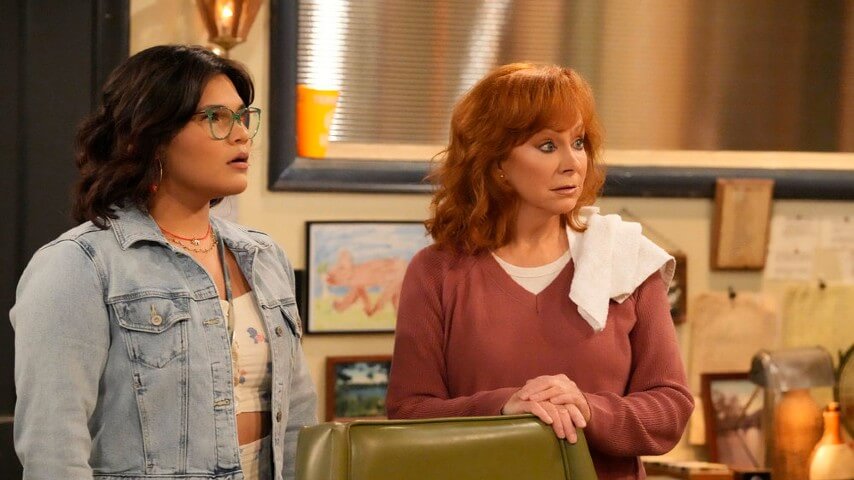Happy's Place is a throwback sitcom that tries to ground itself in the present
Reba McEntire returns in an NBC show that mines laughs from generational differences
Belissa Escobedo as Isabella, Reba McEntire as Bobbie (Photo: Casey Durkin/NBC)
The American multi-cam sitcom seems to forever live embalmed in a past that never was and a present that doesn’t really exist. There’s something about those flattened sets designed for its cameras (and live audiences) and the two-dimensional characters they tend to house (sometimes literally) that cannot help but harken back to television’s origins, laugh tracks serving as a kind of haunting sound of how communal of an experience television broadcasts could and have been. We bring all of this up because Happy’s Place, Reba McEntire’s much-touted return to network-TV comedy exists as a throwback proposition that bravely tries to ground itself, however imperfectly, in a modern, ever-changing world.
When we first meet Bobbie (McEntire) she’s reeling from the recent death of her father—well, both reeling from said loss and elated at the way she hopes to keep his memory alive: by continuing to run his tavern. Happy’s Place has been her life for the past decade and while its many employees may drive her a bit batty, she’s found her groove among them—and they have as well. Sitcoms, though, don’t thrive on things as usual. The status quo demands an upheaval, and that comes to Happy’s Place in the form of Isabella (Belissa Escobedo), a young woman who, Bobbie soon learns, is the half-sister she never knew she had—and a half-sister she’ll have to get along with since Isabella now owns half of the tavern. And wouldn’t you know it, classic sitcom hijinks ensue! For of course this young Latina doesn’t quite see eye to eye on much of what Bobbie’s been doing with the tavern; she soon finds out why the employees at Happy’s Tavern talk about “red thunder” when Bobbie is in a mood. Will they ever get along? Will they become the family they perhaps have always needed? Will the tavern get thrust into the present Isabella represents while keeping the past Bobbie stands for intact?
There’s something quite quaint about Happy’s Place, a comforting familiarity to its rhythms and its jokes, to its plots and its characters—even, or especially, when so many of them rely on Bobbie (and Reba, in turn) trying to connect with the Gen Z vibe Isabella brings to the proceedings. This is, for all intents and purposes, an odd-couple conceit where Bobbie’s ways of doing things will constantly clash with her younger sibling, who’s all too eager to find her place in the titular bar and in Bobbie’s life as well. As Bobbie bluntly puts it at one point, “I use experience; she uses TikTok videos.” If the two are going to get along, it’ll mean bridging that generational divide—all while making jokes about lingo like “bussin” and “ghost-lighting,” er, we mean “gaslighting.”
Blending their two worlds—or rather, folding Isabella’s into Bobbie’s—is precisely what the show wants to do at every turn, even when in format and structure it remains stuck in a world (or a past maybe) where the realization that your father had a child you didn’t know about is nothing but fodder for a hissy fit designed to garner laughs. For a show that opens with a death and depends on having to upend what Bobbie knew about her father, Happy’s Place remains almost oppressively sunny throughout, finding little else to do with such issues as grief than land a killer punchline. Escobedo is gratingly earnest, tasked with merely being a smiling thorn in Bobbie’s side.

 Keep scrolling for more great stories from A.V. Club.
Keep scrolling for more great stories from A.V. Club.